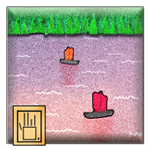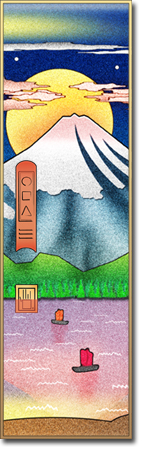On The Way: The Daily Zen Journal
The Empty Bowl Sutra
Manjushri Bodhisattva
Thus have I heard: Once when the Bhagavan was dwelling near Sravasti in the Anapindada Garden of the Jeta Forest and expounding the Dharma to the assembly, Manjushri Bodhisattva put on his robe at dawn, picked up his bowl, and proceeded slowly toward the city.
A bodhisattva named Nagasri saw him and asked, “Where are you going, Sir?”

Manjushri answered, “I’m going to Sravasti to beg for food in order to uplift and benefit others, to show compassion for all beings, and to help and comfort devas as well as people.”
Nagasri asked, “If that is so, Sir, have you not yet gotten rid of the conception of food?”
Manjushri answered, “As for the conception of food, I don’t see it as existing. What is there to get rid of? And how so?
“The fundamental nature of all things is empty. Like space, it contains nothing to put an end to. How could I get rid of it?
“Neither devas, Mara, Brahma, nor the monks and priests of this world can get rid of it. And why not? Because the essential nature of all things is like that of space: ultimately empty, immutable, and devoid of anything to get rid of.

“Moreover, since everything is like space, neither devas, Mara, Brahma, monks, nor any other being can get hold of anything. And how so? Because the essential nature of everything is ungraspable, there is nothing they can get hold of.”
Nagasri said, “If it is as you say, why then do bodhisattvas struggle against Mara?”
Manjushri said, “Bodhisattvas don’t struggle against the drum-beating forces of Mara, nor do they see the slightest thing real on which to meditate. And how so?
“Even though bodhisattvas might see those demon drummers, they aren’t frightened. It’s as if a magician conjured a hostile enemy. Despite the appearance of danger, bodhisattvas aren’t alarmed, for they know that the nature of everything is essentially empty and illusory.
“Hence, they aren’t frightened. If bodhisattvas were frightened, they wouldn’t deserve the support of humans and devas. But because bodhisattvas aren’t afraid of what they know to be empty, they’re worthy of serving as fields of pure blessings.”

Nagasri asked, “Can they realize enlightenment?”
Manjushri answered, “Yes, they can.”
Nagasri asked, “Who realizes it?”
Manjushri answered, “Those with no name, concepts, or anything to say, they can attain it.”
Nagasri asked, “If that is true, how can they realize it?”
Manjushri answered, “By not thinking about it, by not thinking about enlightenment or a seat of enlightenment….Anyone who can free themselves from projections and views can realize enlightenment.”
Nagasri asked, “In that case, what do you think about when you attain it?”
Manjushri answered, “There is nothing to attain and no one who attains. It isn’t something you consider. You don’t think,
‘I shall sit on a diamond seat under the Bodhi Tree and realize enlightenment and turn the wheel of the Dharma and rescue others from samsara.’
And why not? Because dharmas are immutable. You can’t get rid of them, and you can’t get hold of them. They’re ultimately empty. It’s by means of this thought of non-attainment that you attain enlightenment.”
Nagasri said, “Sir, what you have said is truly transcendent and will surely help others who believe and understand this teaching get free from afflictions. And by getting free from afflictions, they will finally be able to break free from Mara’s net.”
Manjushri said, “Mara’s net is unbreakable. And why is that? ‘Mara’ is simply another name for enlightenment. And how so? Neither Mara nor his demon army ultimately exist. They can’t be found. This is why I say ‘Mara’ is simply another name for enlightenment.”

Nagasri said, “How would you describe enlightenment?”
Manjushri said, “Enlightenment is present in all things at all times and in all places. Just as nothing obstructs space, which is present in all things at all times and in all places, the same is true for enlightenment.
“Because nothing obstructs it, it’s present in all things at all times and in all places. Thus, nothing is greater than enlightenment. What kind of enlightenment do you want to realize, Sir?”
Nagasri said, “I want to realize the highest kind.”
Manjushri said, “The highest kind of enlightenment isn’t something you can realize. What you would realize would be tantamount to nonsense. And how so?
“The highest kind of enlightenment would be a featureless nirvana. Hence, what you would realize would amount to nonsense. It would be like someone saying, ‘I will conjure an illusory person sitting on the seat of enlightenment who realizes an illusion of enlightenment.’
“To say something like that would amount to utter nonsense. An illusory person is an impossibility, how much more so one who can realize an illusion of enlightenment.
“One illusion can’t become part of or separate from another illusion. Concerning that which is essentially empty, there is nothing to grasp and nothing to let go. The buddhas and bhagavans have said that dharmas can’t be discriminated. They are nothing but illusions.
“The kind of enlightenment you would realize would amount to discriminating an illusion. Dharmas can’t be grasped, and they can’t be let go. There’s nothing to create and nothing to destroy. No dharma can create or destroy another dharma. And no dharma can become part of or separate from another dharma. And how so?
“Dharmas don’t come together or separate. They’re essentially empty and devoid of a self or anything that belongs to a self. They’re exactly the same as space. There’s nothing to describe or point to, nothing to praise or disparage, nothing to elevate or debase, nothing to diminish or increase. They can’t be imagined and can’t be fabricated.
“Their very nature is quiescent and ultimately empty. They’re like illusions or dreams. In the absence of anything to which to compare them, how can they possibly be discriminated?”
Nagasri said, “Wonderful, Sir! I will surely attain enlightenment as a result of this. And how so? Because you, Sir, have explained to me the most profound teaching.”
Manjushri said “Just now, I did not explain anything apparent or hidden, profound or superficial. How could it help you attain enlightenment? And why is that? The essential nature of any dharma can’t be explained. Saying that I have explained the most profound teaching amounts to nonsense.
“In truth, I can’t explain anything and certainly can’t explain the essential nature of anything. If someone said, ‘I can describe what an illusory person perceives’ or ‘the perceptions of an illusory person differ like this and like that,’ such a description would only damage their own veracity. And how so?
“An illusory person has no consciousness, much less any perceptions. Just now, your statement that my explanation of this most profound teaching could help you realize enlightenment is like that. All dharmas are illusory. They’re essentially empty and can’t be known, much less described.”
Bodhisattva of Wisdom, Manjushri from the Empty Bowl Sutra
Excerpted from A Day in the Life: The Empty Bowl and Diamond Sutras trans by Red Pine 2018





Returning to the sutras presents many challenges. The Empty Bowl Sutra exemplifies what a conversation is like between someone speaking from the highest realization to someone who is asking questions we might be asking ourselves. The inherent difficulty here is what happens speaking from an absolute point of view to someone in the relative space where forms are still forms and who is seeking a way to see beyond that limitation.
It begins with an innocent enough sounding question and a very understandable answer, “I’m going to Sravasti to beg for food in order to uplift and benefit others, to show compassion for all beings, and to help and comfort devas as well as people.”
Here compassion for all others is voiced followed by a teaching on the formlessness of everything. That is a huge jump. For beginners they will feel lost from here on out; for practitioners of moderate experience, they can understand on some level what Manjushri is teaching, but there will be places where they too will glaze over.
What do we do in the face of such vastness? If someone sits with a koan as part of practice, any one line could be contemplated. The other very real question is what does it actually feel like to experience things devoid of a sense of self while having “just enough” sense of self to be able to perceive this world?
Aspiring with you,
Elana, Scribe for Daily Zen